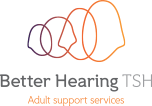communication is a two-way street
Many listening difficulties can be greatly improved by wearing hearing aids, but they are not a cure for hearing loss and cannot restore ‘normal’ hearing. In difficult listening situations, like a noisy restaurant or gathering, effective strategies employed by the speaker and listener are essential for easier communication.
Listening +
Our Listening + course is run over two 45 minute appointments with one of our Audiologists. The course is designed to introduce you to some of the most common problems experienced by people with hearing loss, and ways of coping with them.
This program is not about using hearing aids; rather, the focus is on how you manage your hearing difficulties with or without hearing aids. During the sessions you will learn tips and tricks to improve your home listening environment, cope with difficult speakers and listening situations, and improve your communication skills. Anyone can attend and benefit, so it is important for someone close to you to join in, ask questions and work with you to implement some of these strategies in your everyday life.
General listening tips:
Ask people to speak a little louder and more clearly - not to shout or use exaggerated mouth movements as this distorts speech
Ask people who speak quickly to slow down or add in a few pauses to allow time to “catch up”
Speak face to face and ensure that there is good lighting on the speaker’s face - lip reading is particularly important to supplement your hearing
Ask for people to rephrase, not repeat - the more information you can gather, the greater your chance of understanding
Avoid saying “what?” or “pardon?” - if something is missed, repeat what you heard and ask for clarification
Move closer to the person or sound source that you want to hear
Position your back to the noise - you ears will naturally filter out some of the interfering noise from behind to help you to focus on someone speaking in front of you
Avoid problematic background noise by moving somewhere quieter or removing the source of the noise
Inform the person you are talking to that you have trouble hearing and suggest ways in which they may help you to hear them better. This is very important! People will often be happy to make the extra effort if they understand the problem.
Auditory training workshops and support services:

